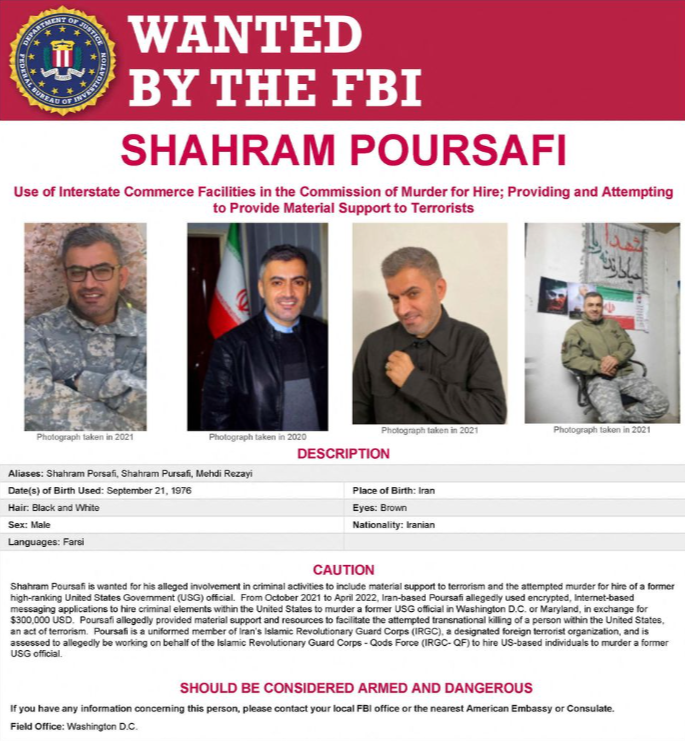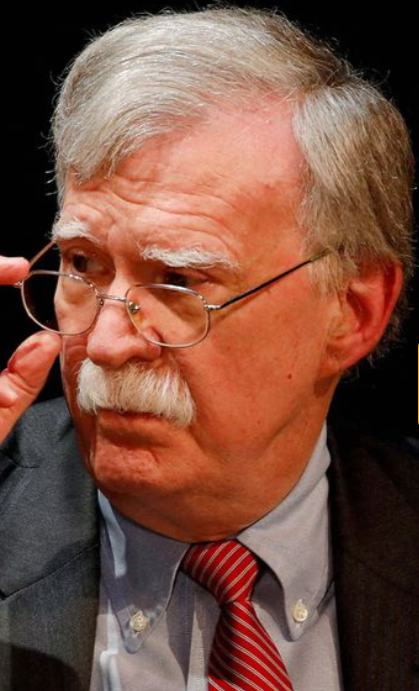September 23, 2022
 The United States has charged a Pasdar with trying to hire an American resident to assassinate John Bolton, one-time national security adviser to President Donald Trump.
The United States has charged a Pasdar with trying to hire an American resident to assassinate John Bolton, one-time national security adviser to President Donald Trump.
The incident is just one in a long series of Pasdar retaliation operations that have utterly failed. In a multitude of plots around the world, the Pasdaran have managed only to injure the wife of an Israeli military attache in India.

The Justice Department alleged August 10 that Shahram Poursafi, also known as Mehdi Rezayi, 45, of Tehran, tried to hire an assassin to kill Bolton, saying it was in retaliation for the death of Maj. Gen. Qassem Soleymani, commander of Iran’s Qods Force, who was killed in a US drone strike in January 2020.
Iran has often cited Bolton as a figure in the assassination, although it was proposed and executed three months after Bolton left office in September 2019.
Poursafi is presumed to be living in Tehran and the public announcement that he is wanted will likely guarantee that he stays there to avoid arrest in another country.
According to the criminal complaint, Poursafi schemed over the murder-for-hire plan from October 2021 through April 2022, when it appears to have fizzled out.
It started when Poursafi asked a “US resident” identified only as “Individual A” to take photographs of Bolton, under the guise that the photos were needed for a forthcoming book. The US resident was presumably an Iranian-American whom the Pasdaran erroneously thought was sympathetic to the Islamic Republic. That American resident then introduced Poursafi to a covert government informant, whom it was said could take the photographs for a price.
Investigators said the following month Poursafi contacted the informant on an encrypted messaging application and offered the person $250,000 to hire someone to “eliminate” Bolton. The fee was later negotiated up to $300,000.
“Poursafi added that he had an additional ‘job,’ for which he would pay $1 million,” the Justice Department said. But the target of that second job was never named.
The ostensible assassin stalled, waiting for an initial payment, but only in late April did Poursafi send any money, paying a total of $100 in cryptocurrency.
The court documents indicated Bolton was made aware of the plot and cooperated with investigators, allowing photographs of himself outside his Washington office to be sent to Poursafi.
Over the months Poursafi discussed the plot with his US contact, he disclosed that it related to Tehran’s desire for revenge for the US killing of Soleymani.
Poursafi directed the informant to open a cryptocurrency account to facilitate the payment. In subsequent communications, he told the informant it did not matter how the killing was carried out.
The FBI wanted poster lists Poursafi as speaking only Farsi, so the “US resident” he contacted and the “assassin” Poursafi was put in contact with were presumably both Iranian-Americans. The Justice Department also said Poursafi had never visited the United States.
At one point in the many exchanges between Poursafi and the man he recruited, Poursafi said his intelligence agents had checked Bolton’s house and found that Bolton had no security there. But, in reality, the US government had already stationed security guards in cars that were marked as police vehicles at Bolton’s home. That made the Pasdar intelligence operation look lame.
In a statement on Twitter, Bolton thanked the Justice Department for taking action. “While much cannot be said publicly right now, one point is indisputable,” he said. “Iran’s rulers are liars, terrorists and enemies of the United States.”
If tried and convicted, Poursafi would face up to 10 years imprisonment and a fine of up to $250,000 for the use of interstate commerce facilities in the commission of murder-for-hire. Additionally, he would face up to 15 years imprisonment and a fine of up to $250,000 on the second charge of providing and attempting to provide material support to a transnational murder plot.
The attempt to kill an American official on American soil is a dramatic shift for the Islamic Republic. After the revolution, the regime hired an American Muslim to kill a former official of the Shah’s regime. The hired assassin said he wanted to kill former Secretary of State Henry Kissinger, but was told he must not kill any Americans.
After the charges were filed against Poursafi, Jake Sullivan, the President’s national security adviser, issued a statement saying, “Should Iran attack any of our citizens, to include those who continue to serve the United States and those who formerly served, Iran will suffer severe consequences.” Analysts generally believe the Biden Administration would retaliate militarily if Bolton or any other American were to be killed by Iran.
The US government is known to be providing protection to at least four Trump Administration officials because of Iranian threats: Bolton; former Secretary of State Mike Pompeo; former Secretary of Defense Mark Esper; and the senior State Department official who dealt with Iran full-time, Brian Hook.
In Tehran, Foreign Ministry spokesman Nasser Kanani dismissed the US charges as “threadbare and baseless fictions,” despite the fact that the Islamic Republic has repeatedly promised it would retaliate for the assassination of Soleymani. Kanani told the Iranian public the Americans had provided no evidence to support the charges, ignoring the lengthy FBI submission to the courts documenting Poursafi’s contacts seeking the assassination.






















